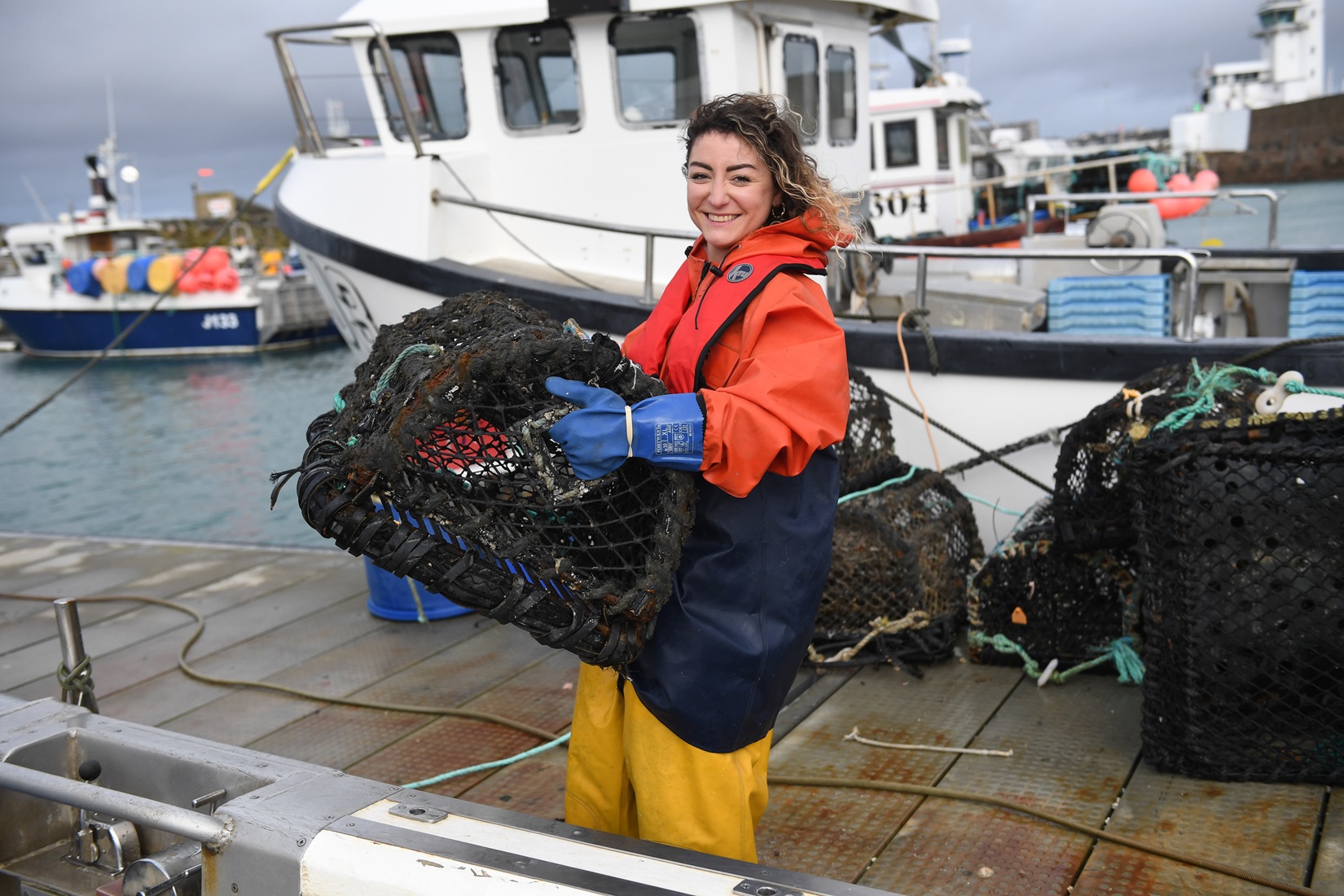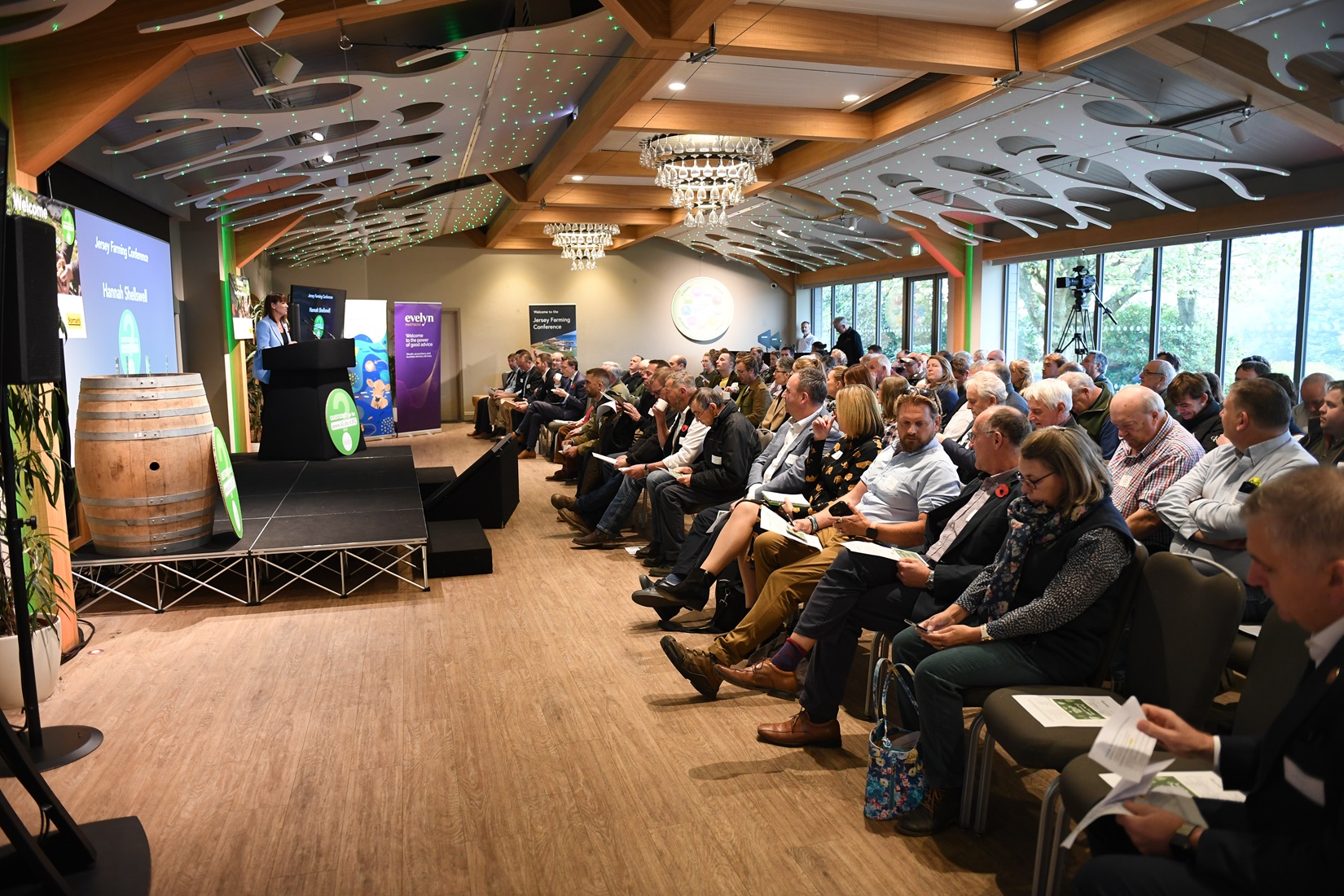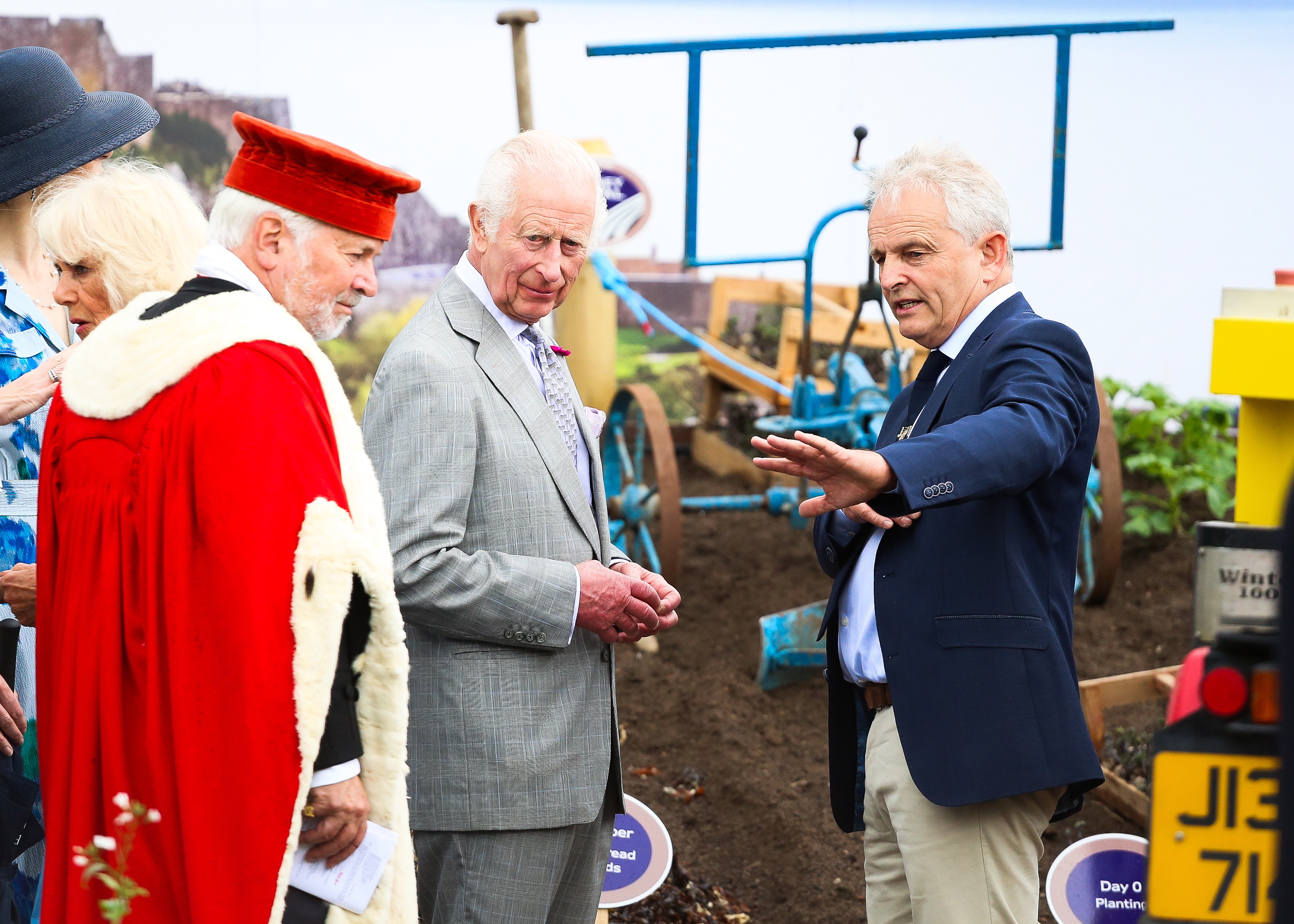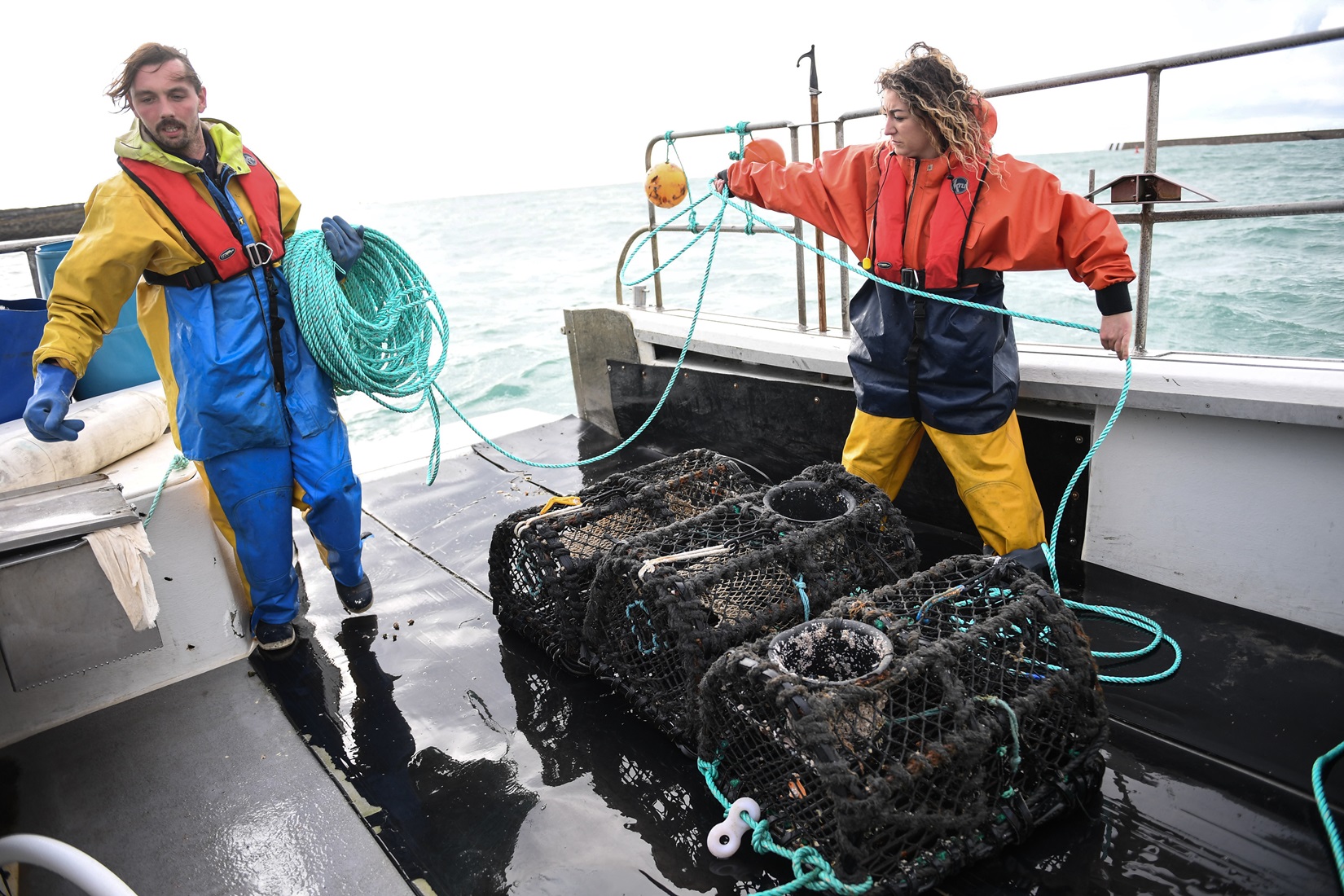


The proportion of Jersey’s workforce employed in the agriculture and fishing sector has dropped by nearly 40% in the past decade, according to the latest data.
Statistics Jersey’s Labour Market figures released last month show that 1.70% of islanders were working as farmers or fishers in June 2024, compared to 2.82% in June 2014.
Economic Development Minister Kirsten Morel is seeking to tackle the trend which would see the historically-dominant sector facing oblivion within another decade.
At last Thursday's Jersey Farming Conference, Deputy Morel announced that the Agricultural Loans Fund has been re-opened for the first time in 20 years with a £10 million funding boost following unanimous approval in the States Assembly.
He said: "These loans will make it easier for businesses in this important sector to develop, and continue to be the protectors of Jersey's natural environment."
Douglas Richardson, President of the Jersey Farmers' Union (JFU), added: "The reintroduction of the scheme is very good news for the sector.
"The Jersey Government has listened to concerns of the industry that we've been putting forward quite vigorously for a number of years.
"These measures ensure we will continue to maintain a viable and sustainable farming sector as a vital part of island life."
The Labour Market information is published every six months, and is used to measure trends in the workforce over time and the dominance of certain sectors.
It breaks the total island headcount down into twelve different sectors – such as education, wholesale and retail, financial and legal activities, public sector – and whether islanders are employed on full-time, part-time, or zero-hours contracts.
Figures are provided for June and December, with the higher June totals for sectors like hotels, restaurants and bars, as well as agriculture and fishing, due to the influx of seasonal workers in the summer.
Fluctuations appear in most sectors, but agriculture and fishing is one of the only sectors to see a steady, year-on-year decline in its number of workers from 1,650 in June 2014 to 1,110 in June 2024.
Meanwhile, the island's total headcount has increased from 58,430 to 65,290.
During this same period, the slice of the workforce finding jobs in the public sector has been steadily growing and stood in June 2024 at 14.9% – or 9,710 islanders.
That sector continues to outstrip all others, with 440 jobs added to the public sector between June 2023 and June 2024.
The data also shows that the number of zero-hours workers in the agriculture and fishing sector is a fraction of what it used to be, with 530 workers on this type of contract in June 2014 and around 80 this summer.
The JFU's Mr Richardson told Express that the steep drop in zero-hours contracts which occurred in 2016 was most likely due to Brexit and the lower numbers of Europeans seeking temporary work in the island.
In particular, Eastern European workers – who were mostly employed on these contracts – are now less likely to come to Jersey due to changes to the ITIS system, and the work permits that most seasonal employees now have require different contracts, Mr Richardson explained.
More generally, he said the diminishing agricultural workforce was partly due to improvements in technology, explaining that more potatoes are now planted using automatic planters in conjunction with hand farming – a cheaper and less labour-heavy process.
However, a number of challenges and external pressures had also reduced the size of the sector.

Pictured: JFU President Douglas Richardson at the Jersey Farming Conference. (Dave Ferguson)
He said: "There are, of course, the added challenges around climate change, where the weather is all the more difficult and our seasons are hard to predict.
"Then there is a lot of compliance to adhere to now, and we've certainly got challenges with living wage, rising cost of labour and how many workers we can employ."
Jersey's minimum wage is set to rise to two-thirds of the median wage from 1 April 2026, and the Government is supporting businesses in this transition.
Environment Minister Steve Luce listed some pressures facing farmers at last Thursday's conference – including that diesel prices are 50% higher than they were in 2020, and fertiliser prices had almost trebled since two years ago.
When these factors were put to Mr Richardson, he agreed, saying: "Inputs are definitely a concern, because all of these are becoming more and more expensive.
"A farmer has to invest an awful lot of money in the soil, and then the crops have to come out of the ground, before any money comes in, so we are an industry that does work on fairly narrow margins.
"That said, there are a lot of challenges that we are rising to, and I think it's testament to the grit that is out there among the local agricultural community that farming is still thriving in Jersey, even if we are in smaller numbers."
Gabby Mason runs Jade-S Fisheries with her partner Leyton Hunnisett.
As well as being First Mate of Jade-S, she seeks to raise the profile of women in the marine industry and recently appeared on the cover of Woman's Weekly.
She said that, like farming, the "exponential decline" of the fishing industry could be put down to a long list of reasons.

Pictured: Gabby Mason is the First Mate on Jade-S, while her partner is the Captain. (Dave Ferguson)
"First, it reflects a change in how we place value on jobs," explained Ms Mason. "Lifestyle and attitude has changed completely over the past ten years and being a fisherman used to be a respected job, but now the public view of the sector is not very high.
"It also used to be a lucrative industry, but now money is far easier made in other industries where it's less of a risk. You can't get a mortgage on a fisherman's salary, you can't keep up with the expensive lifestyle in Jersey, and you can't really support a family either.
"People who are having children soon realise that this industry doesn't support that and have to leave for another industry altogether. Fishers are highly-skilled people and they don't have a problem getting excellent jobs."
Ms Mason has seen former fishers leave the sector to find work in the civil service, as private skippers, and with organisations like Ports of Jersey and Geomarine.
"People who would have been fishermen now go to study marine biology," she continued.
"We send our kids to university so they don't have to do what we're doing. The whole sector is suffering from that next generation not coming through."
She added: "There are also more rules and regulations that have come into place, making things more expensive, and there are now so many restrictions around what you are and aren't allowed to fish. We are all, as a fleet, very pro-sustainability but it does have a massive economic impact."
Climate change is also playing a part in the decline, she added: "Changing water temperatures also cause difficulties as different species migrate away from our waters."
Ms Mason quoted recent studies which found that the chancre crab – a popular local delicacy – no longer mates in Jersey waters because they are too warm and the species has moved off to colder waters in what Ms Mason called a "mass exodus".
There have also been changes in people's eating habits, Ms Mason said, meaning islanders are more likely to buy their fish from supermarkets rather than local fish markets or stalls.
She said: "The world is a changing place, and we just come from an older part of it. The fleet is a bit of history that's left, rather than a modern sector.
"It's a complex problem that has been brewing for a very long time, and it's multi-faceted. It's like a mass extinction: it wasn't just the meteorite that killed the dinosaurs, there are a hundred different aspects that combined to wipe them out. The meteorite was just the final blow."
Farmers, experts and Government ministers last week met at La Mare Wine Estate to discuss the future of the agricultural sector and what can be done to bring it back from the brink of extinction.
Sustainable farming methods was the theme of the conference, but the sustainability of the sector was also up for discussion.
In fact, the mood was hopeful – and the data reflects that.
The agriculture and fishing sector saw an increase of 30 workers over the past year – with those extra jobs highly likely to be solely in agriculture, according to Ms Mason.
The sector's headcount has also stabilised from 2020 to 2024 – while the size of the industry within the overall headcount is still decreasing, it seems no longer set for extinction.

Pictured: The Jersey Farming Conference brings together the sector for a discussion about its future. (Dave Ferguson)
It was standing room only when Economic Development Minister Kirsten Morel took to the stage to announce that he was correcting the historic underfunding of the sector.
As well as the £10 million now available in the Agricultural Loans Scheme, Deputy Morel also announced he will be proposing to increase funding for rural and marine sectors by £1.1 million over the next two years.
This additional funding would be delivered through the Rural Support Scheme, which was launched in December 2022 and introduced "credits" for farmers for the first time, rewarding them for providing "public good", such as minimising waste, creating conservation areas and managing hedgerows.
Data supplied from the Government to Express found that the number of businesses and individuals enrolled in that scheme has increased from 44 in 2022, to 61 in 2023, and 83 in 2024.
Pictured: The Economic Development Minister said he hoped the Agricultural Loans Scheme would correct the underfunding of the sector in recent decades. (James Jeune).
Deputy Morel said: "I am firmly of the opinion that if we do not invest in our farming and fishing industries as a society, those industries will not be able to compete and will disappear from island life. We have come precariously close.
"It was not too late for Government to step up its support for agriculture, but we could not leave it any later."
While the Government provides more direct support to the sector, Farm Jersey CEO John Garton provides it with indirect support through marketing and organising events like the Jersey Farming Conference.
He said: "Farming is not the biggest employer or the biggest industry anymore, but it is incredibly important.
"It gives us our sense of place – our position on the planet, even. Don't think that we're going to let go anywhere any time soon."
He referred to island products which are known the world over like Jersey Royals, dairy products from Jersey cows, and oysters.
These were all on display at the 'Jersey Expo' which Mr Garton organised at the Weighbridge for the Royal Visit this July.

Pictured: JFU President Mr Richardson mingled with royalty during their Royal Visit this July. (Jon Guegan)
He said the agricultural loans were making ventures into the sector "more viable".
Mr Garton explained: "There are still issues in the sector, and we don't want to paper over them, but now the Government schemes are working, they reward for activity and how land is farmed, and that is encouraging. That the Government understands the sector and is listening. Farming is here to stay, it's not going anywhere."
Mr Richardson also hailed the announcements as "very good news for the sector", adding: "The younger generation are looking at farming a bit more seriously."
While the mood is hopeful for agriculture, fishing is another story.
Environment Minister Steve Luce admitted at Thursday's conference that the fishing industry is "under real, big pressure at the moment".
He said in response to questions at the end of the speech: "It's difficult to find the stuff to catch, and it's difficult to export, it's difficult to make money. I'm going to try and help them as much as I can."
Ms Mason, who in fact left her public sector role to pursue a career in the fishing industry, insisted that her story was an exception and not one she expected to see replicated.
Referencing the increase of 30 workers to the sector in the latest Labour Market report, Ms Mason said: "Those 30 additional jobs will not be in fishing."
The fleet is so small that she would be aware of newcomers, she explained.

Pictured: Ms Mason said fishing was a difficult industry and many are jumping ship. (Dave Ferguson)
"It feels like we're an industry that's been completely forgotten about," she said. "Political and financial support is slowly starting to be developed, but we are still a long way off from having something that will keep us going far into the future.
"Businesses have tried their hardest to keep going and fighting the good fight, but it's become too difficult. I think it's only going to dwindle further.
"I personally don't believe there is much hope for the future of the fishing industry, because while we were once a well-regarded fleet, we're a very small number now.
"There are probably 30 full-time active fishing boats – in the next five years, we'll be surprised if there's 10, if that. Our forefathers might have been able to do it, but we can't. Culturally, it's going to be a huge loss when the fishers disappear."
Comments
Comments on this story express the views of the commentator only, not Bailiwick Publishing. We are unable to guarantee the accuracy of any of those comments.